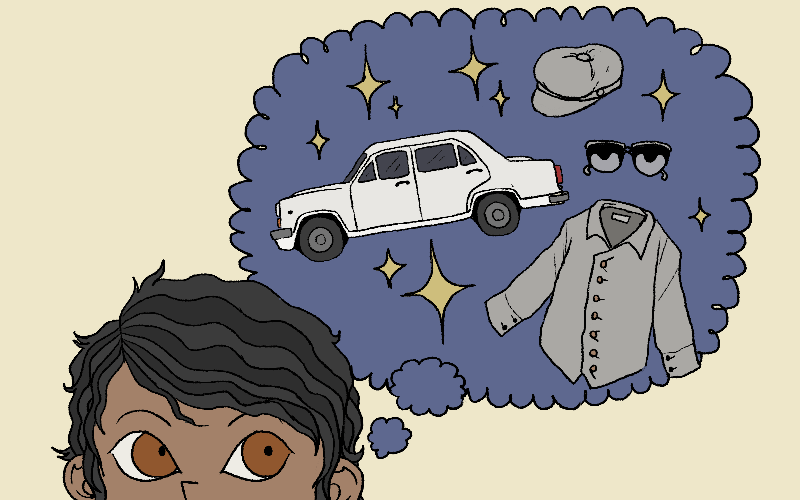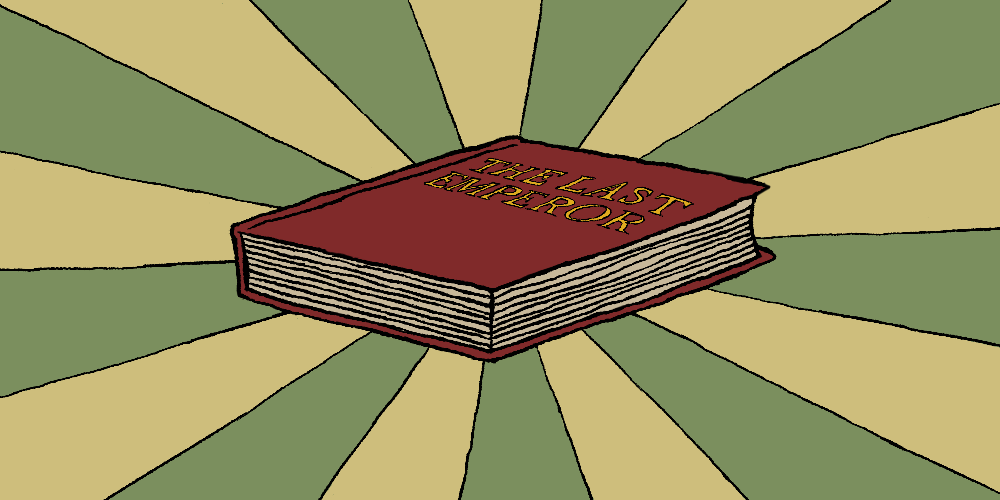The boy of 11 is at a book fair. School is out in Cochin, India, and he has dragged his father along to the book fair in the city. In two days’ time, the family is going on vacation to Ahmednagar, where his father’s elder brother stays. The uncle works in a sugar factory there, and he has invited them all over. I don’t remember whether the prospect of the trip excited the boy. I do remember at the time, he was toying with the idea of reading what one of his friends called a “Big Book.” Now, a “Big Book” gets you places — that is what his friend said — directly quoting his mother. All “Great Men” used to read “Big Books.”
That is why the boy is holding in his hand a copy of The Last Emperor. The father looks at the price, scowls, and then pays. Who is he to stop his son from being a “Great Man?”
The boy has his reasons for wanting to be a great man. It would teach his friends at the local playground that it was a grave mistake to banish him from the playground for threatening to not give him his cricket bat, which was the only bat the group had, unless he was allowed to bat first. Of course, they got another bat. He is on the bus, back home and is imagining stepping out of a shining white Ambassador car wearing a raincoat, a hat on his head, and sunglasses. At the time, the boy imagined wearing a raincoat to be the height of fashion. He would look nonchalantly at all his friends who would, by then, have turned around to look at who it was that had arrived in said car. Not a Maruti or a Fiat, but the King himself, the Ambi. From the car would alight cricketer Sachin Tendulkar, the best batsman in the world, who would also look nonchalantly at his friends. He imagined his friends’ jaws opening wide enough to drive the Ambi straight into their stinky mouths. Sachin would hug him, and they would get back into the car and drive away. The fantasy — in various permutations and combinations — is all that was on his mind on the hour-long ride back home. It was a hot day, and his father mumbled something about the air smelling like death itself, about how there was not a single tree to be seen around.

A peculiar excitement tinged with a sense of loneliness was felt by the boy when they awaited the train at night. Every Sunday the boy, along with his sister and father, would drive their mother to this very station to see her off. She worked in another town and was with them only on weekends. She would sometimes cry and hug the little boy, and the boy, convinced that she was crying because of his low marks, would tell her that he would score better marks next time around. Sometimes thought his mother would be all happy, and they would discuss school, watch TV, and soon it would be Sunday evening. But there were days when all she did was sleep and discuss the strain at work with the father.
The train journey was uneventful, more or less. There was a young man in their compartment who was in the army and was returning to report for duty after his leave. The boy’s sister, seven years elder to him, talkative and haughty, behaved like a prim and proper princess throughout the journey. She who had read only Mills and Boons, on hearing that the Army man enjoyed reading, pretended to be lost in the pages of The Last Emperor.
One incident of interest did take place. In one of the berths somebody found an abandoned bag. It was the summer of ’93. The boy remembered the elders discussing, “Babri Masjid,” “Terrorists,” and “Bombs.” Finally, the army man volunteered to see what was inside the bag but only found some clothes stuffed in. Everyone clapped at the bravery of the young man.
The Uncle was at the station to receive them, and they got on to a crowded bus and journeyed to the uncle’s place. There was something odd the boy noticed. Men and women sat together. Not husbands and wives. Strangers. This is something, which never happened in the city. The air was chilly, and a lot of women were wrapped in shawls, babies propped up in their arms. The men looked rough, as though they had labored under the sun their whole lives. His uncle said that he lived in a village, and the occupation of the folks there was mainly farming. There was a sugar factory too, where the uncle said, he worked. He lived in the factory quarters built for the workers of the factory. That is where they were headed.
The uncle was a portly man, always of good cheer who left his place of birth when he was 20, to find work. The boy had only seen him on a few family occasions. He had a wife, who lived in a nearby place where she worked as a teacher, and their daughter stayed with her.
There were rolling fields of wheat, bullock carts, and the air smelled alive. There were boys of his age who played cricket in the chilly evenings, pretending to be cricket players of the national team just like they did back home. Cold evenings were spent listening to fart jokes, their childhood. It was cold all the time, in the morning, in the afternoon in the evening, and the night. They went to the sugar factory, where the uncle lifted the boy and his sister up and helped them dip their fingers into a long pipe-like machine where thick and delicious raw brown sugar flowed.
There was a trip to the aunt’s place, and from there they took a jeep to a place far off where women and men in strange poses were carved into the rocks of a tall mountain.
The copy of The Last Emperor was forgotten and on the last day of the trip talking to his uncle about his plan of becoming a “Great Man” and taking revenge on his friends back home, his uncle came up with an idea. They would buy a bat and the uncle would sign it.
“So what, those guys don’t want my bat, they have another one.”
“Sure, they don’t want an ordinary bat, but what about a bat signed by Sachin Tendulkar?”
“But Sachin has not signed my bat,” said the boy.
“Sure did, you did meet him in the airport.”
“Which airport?”
“The airport where your uncle took you while on holidays, now look at this paper.” The Uncle scribbled something on a piece of paper. The sign was incomprehensible. The glee/hate look was back in the boy’s eyes.
What does the boy remember now?
The father had borrowed a camera from a friend for the trip. Hence there are a few faded photographs. In one, the boy and his sister are standing in the center of a sunflower field with the sun beating down on their faces. The Sister’s face is tilted in spontaneous laughter. There is another one taken at the caves. The mother is sitting with her face buried in her lap. It is clearly evening because the photo is dark. There is yet another of the families standing together in front of the aunt’s house.
Both the families had their share of misfortunes and their slices of good luck — as it happens to families all over. The portly uncle passed away. The Mother took voluntary retirement at 50 and spent the rest of her life, playing with her grandkids, taking her husband window shopping, and reading lots of books. After her death, the father spent his time working in the garden, tending to the plants and flowers; making a swing when his grandkids came home for Christmas. The boy’s trick lasted for just one week. A “friend” of the boy’s returned from Bombay with a tissue paper signed by Sachin. There was a slight tussle within the gang, but ultimately, the group went with the friend’s tissue paper. The boy was lifted by the scruff of his neck and thrown into a dirty puddle.
It is getting dark up there in Ajanta and Ellora. The father notices the mother sitting with her head buried in her lap. He scowls, then takes out the camera and captures the moment. The mother lifts her face and smiles warmly, and the boy’s father takes another pic. The mother’s thoughts were somewhere else. The father walks over and sits near the mother and they watch their kids.
The copy of The Last Emperor is still there on my bookshelf.•




